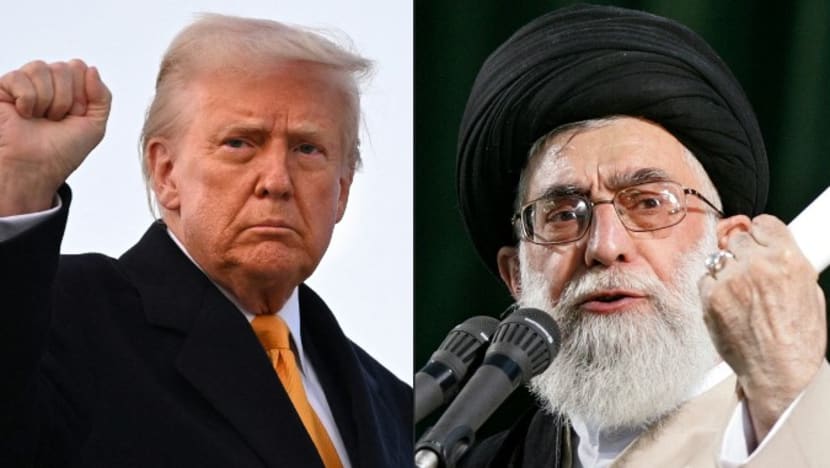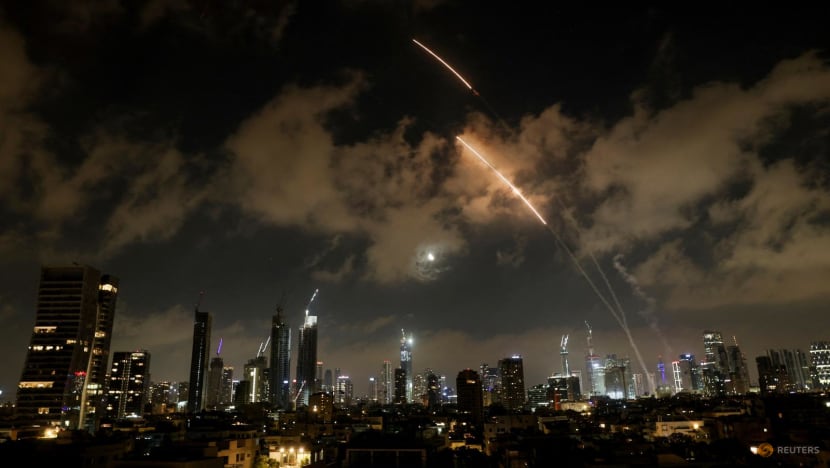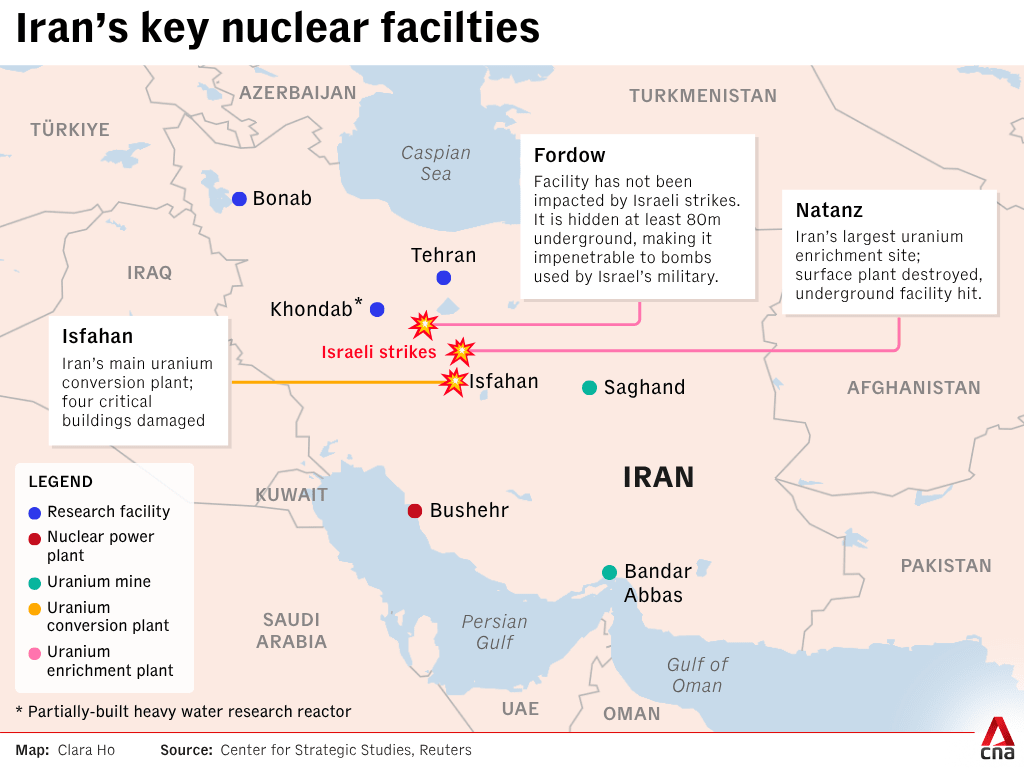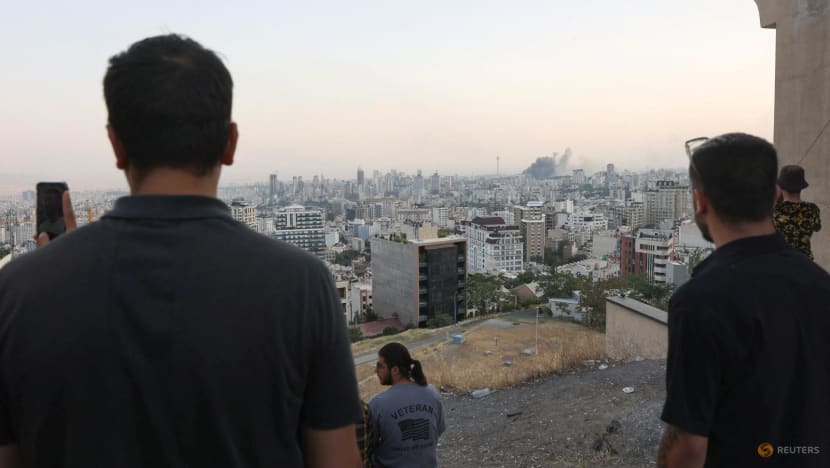Iran's supreme leader says any US strikes on Iran will have serious consequences

US President Donald Trump pumping his fist as he boards Air Force One at Joint Base Andrews in Maryland on Mar 7, 2025; Iran's supreme leader Ayatollah Ali Khamenei delivering a speech in Tehran on Jun 4, 2007. (File photos: AFP/Roberto Schmidt, Thomas Coex)
DUBAI: Iran's Supreme Leader Ayatollah Ali Khamenei responded on Wednesday (Jun 18) to US President Donald Trump's call for the country to surrender, warning that any US strike will have "serious irreparable consequences".
Iranians do not respond well to threats, he said in a televised address, adding that the country will not accept an imposed peace or war.
"This nation will never surrender to imposition from anyone," Khamenei said. "America should know that any military intervention will undoubtedly result in irreparable damage."
He also called Trump's surrender ultimatum "unacceptable".
Khamenei also took to X to hit out at the US.
"The Zionist regime’s malicious attack on our country took place at a time when Iranian officials were indirectly engaged in negotiations with the US side. There was no indication on the part of Iran that signalled a military move," Khamenei said on X.
"It was already suspected that the US was involved in the malicious move carried out by the Zionist regime, but considering their recent remarks, this suspicion is growing stronger day by day," he said.
A flurry of social media posts from Trump on Tuesday, including a demand for Iran's unconditional surrender and a post musing about killing Khamenei, increased speculation that he could bring the United States into the war.

A source familiar with internal discussions said Trump and his team were considering a number of options, which included joining Israel in strikes against Iranian nuclear sites.
Iran had conveyed to Washington that it would retaliate against the United States for any direct participation, its ambassador to the United Nations in Geneva, Ali Bahreini, said. He said he already saw the US as "complicit in what Israel is doing".
"We will not show any reluctance in defending our people, security and land - we will respond seriously and strongly, without restraint."
FLEEING TEHRAN
Thousands of people were fleeing Tehran on Wednesday after Trump said they should leave the capital, while a source said Trump was considering options that include joining Israel in attacking Iranian nuclear sites.
An Israeli military official said 50 Israeli jets had struck around 20 targets in Tehran overnight, including sites producing raw materials, components and manufacturing systems for missiles. Israel told residents in a southwestern area of Tehran to evacuate so its air force could strike.
Iran responded with a fresh volley of missiles at Israel, and a new warning that it would respond against the United States if Washington joined the war.
Roads north out of Tehran were jammed with traffic.
"We left Tehran this morning. My children were frightened, and we’re going to stay at my brother’s house near Karaj," Alireza, 37, a businessman, told Reuters by phone.
Arezou, 31, had made it out of the capital and was in the nearby resort town of Lavasan.
"We will stay here as long as this war continues. My friend’s house in Tehran was attacked and her brother was injured. They are civilians," she told Reuters. "Why are we paying the price for the regime’s decision to pursue a nuclear programme?”
Iran has been exploring options for leverage, including veiled threats to hit the global oil market by restricting access to the Gulf through the Strait of Hormuz, the world's most important shipping artery for oil, which it controls.
Former Iranian Economy Minister Ehsan Khandouzi said on X that Iran should quickly start requiring permission for tankers transiting the strait, a move he said would be "decisive" if implemented quickly. Iran's Oil Ministry and Foreign Ministry did not immediately respond to requests for comment.

BAN ON FILMING
Inside Iran, the biggest attacks since war with Iraq in the 1980s have wiped out an echelon of senior leadership.
Authorities are intent on preventing panic and shortages, and fewer images of destruction have been allowed to circulate than in the early days of the bombing, when state media showed pictures of explosions, fires and flattened apartments. A ban on filming by the public has been imposed.
Authorities have placed limits on how much fuel can be purchased. Oil Minister Mohsen Paknejad told state TV that restrictions were in place to prevent shortages but there would be no problem supplying fuel to the public.
With Khamenei's main military and security advisers killed by Israeli strikes, the leader's inner circle has been narrowed, raising the risk that he could make strategic errors, according to five people familiar with his decision-making process.
Iranian officials have reported at least 224 deaths, mostly civilians, though that toll has not been updated for days.

In Israel, Iran's retaliatory strikes are the first time in decades of shadow war and proxy conflict that a significant number of missiles fired from Iran have penetrated defences, killing Israelis in their homes.
Since Friday, Iran has fired around 400 missiles at Israel, some 40 of which have pierced through air defences, killing 24 people, all of them civilians, according to Israeli authorities.
Explosions were heard over Tel Aviv on Wednesday. The military said two barrages of Iranian missiles were launched toward Israel in the first two hours of Wednesday morning.
Iran's semi-official Mehr news agency reported clashes early on Wednesday between security forces and unidentified gunmen in the city of Rey, south of Tehran, adding that assailants may be linked to Israel and intended to carry out "terrorist operations in densely populated areas of the capital". Reuters could not independently verify the situation there.
Iranian news websites said Israel was attacking a university linked to Iran's Revolutionary Guards in the country's east, and the Khojir ballistic missile facility near Tehran, which was also targeted by Israeli airstrikes last October.
TRUMP KEEPS WORLD GUESSING
Trump's social media posts - which have ranged from diplomatic offers to end the war to threats to join it - have created uncertainty over his intentions.
The US has so far taken only indirect actions in the conflict, including helping to shoot down missiles fired toward Israel. But Washington has capabilities that Israel lacks, including massive bombs able to destroy Iran's nuclear enrichment plant, built deep under a mountain at Fordow.
On Tuesday he mused about killing Iran's Supreme Leader Ayatollah Ali Khamenei: "We know exactly where the so-called 'Supreme Leader' is hiding," he wrote on Truth Social. "We are not going to take him out (kill!), at least not for now ... Our patience is wearing thin."
Three minutes later Trump posted, "UNCONDITIONAL SURRENDER!"
The US is deploying more fighter aircraft to the Middle East and extending the deployment of other warplanes, three US officials told Reuters.
A source with access to US intelligence reports said Iran had moved some ballistic missile launchers, but it was difficult to determine if they were targeting US forces or Israel.
Iran, for its part, has lost much of its capability to retaliate against Israel through proxy fighters close to Israeli borders during the past 20 months of Israel's war in Gaza. Israel has pounded Iranian allies Hamas in Gaza and Hezbollah in Lebanon. Syrian leader Bashar al-Assad, propped up by Iran through 13 years of war, was toppled last year.















